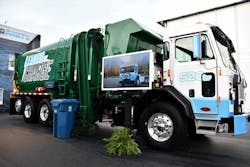Peterbilt Progresses on Electrification
Peterbilt Model 520EV battery-electric truck designed for the refuse industry has been operating on demonstration routes to show it can work a full shift on a single charge, recharge overnight, and work another day.
“Our customers have been very impressed with the 520EV’s quiet operation, low maintenance cost, and overall performance,” said Jason Skoog, general manager, in a prepared statement.
The Model 520EV is powered by a Meritor/TransPower Energy Storage Subsystem with a total storage capacity of 308 kWh. It is driven by a TransPower Mid-Ship Motor Drive Subsystem with up to 430 horsepower, features a range of about 100 miles, and a four-hour charge time.
Peterbilt said it has seen record production rates and sales growth for the Model 520 overall.
“Peterbilt has set low-cab forward truck production records five years in a row,” said Skoog. “Since the launch of the 520 in 2017, customers across North America have put this truck into service at a record pace.”
The 520 is available in right-hand, left-hand, right-hand standup, and dual drive configurations. The updated interior offers a quiet work environment for drivers and allows for simplified integration for body builders. Powertrain options the Paccar MX-11 10.8 liter diesel engine, a natural-gas powered Cummins ISL12-N, as well as the battery-electric Model 520EV.
“Even at the Model 520’s record production rates, we have more capacity to satisfy the demand of our refuse customers, who continue to benefit from the performance, durability and reliability of this outstanding product,” said Skoog.
In addition to the 520EV, Peterbilt has fielded two other battery-electic trucks: the 579EV and 220EV. The company has 16 of the vehicles in the field and run up a total of 40,000 miles of operation.
“Mileage accumulation is an important component of the validation process leading up to our low-volume production starting in the fourth quarter of 2020,” said Scott Newhouse, Peterbilt chief engineer, in a statement. “All three platforms are performing well and customers are starting to see the benefits of these advanced vehicles.”
Additional vehicles will be put into service in the first half of 2020 in drayage, regional haul, medium-duty pickup-and-delivery applications, according to the company.
Electric powertrain developments
Peterbilt also announced a collaborative agreement with Dana on electric powertrain development for the Model 220EV, integrating Dana’s Spicer Electrified e-propulsion system into its chassis. The truck will also be equipped with two battery packs and an on-board charger.
The 220EV features a range between 100 and 200 miles. Using the vehicle’s DC fast-charging system, the high-energy density battery packs can recharge in about an hour, making the 220EV ideal for local pickup and delivery, as well as short regional haul operations, according to the company.
“By using the Dana electric powertrain for the Model 220EV in the medium duty pickup-and-delivery market, we will be ready to meet the growing demand of our customers who want to incorporate zero-emissions vehicles into this application,” said Skoog in a statement.
“We are pleased to collaborate with Peterbilt by providing the complete e-powertrain, including the integration, and upfit for the Model 220EV electric vehicle,” said Mark Wallace, president of commercial vehicle drive technologies for dana. “Combining Peterbilt’s advanced technologies with our own expertise in delivering end-to-end turnkey electric systems, will result in highly-efficient solutions that will lead to low total cost of ownership.”
Source: Peterbilt
